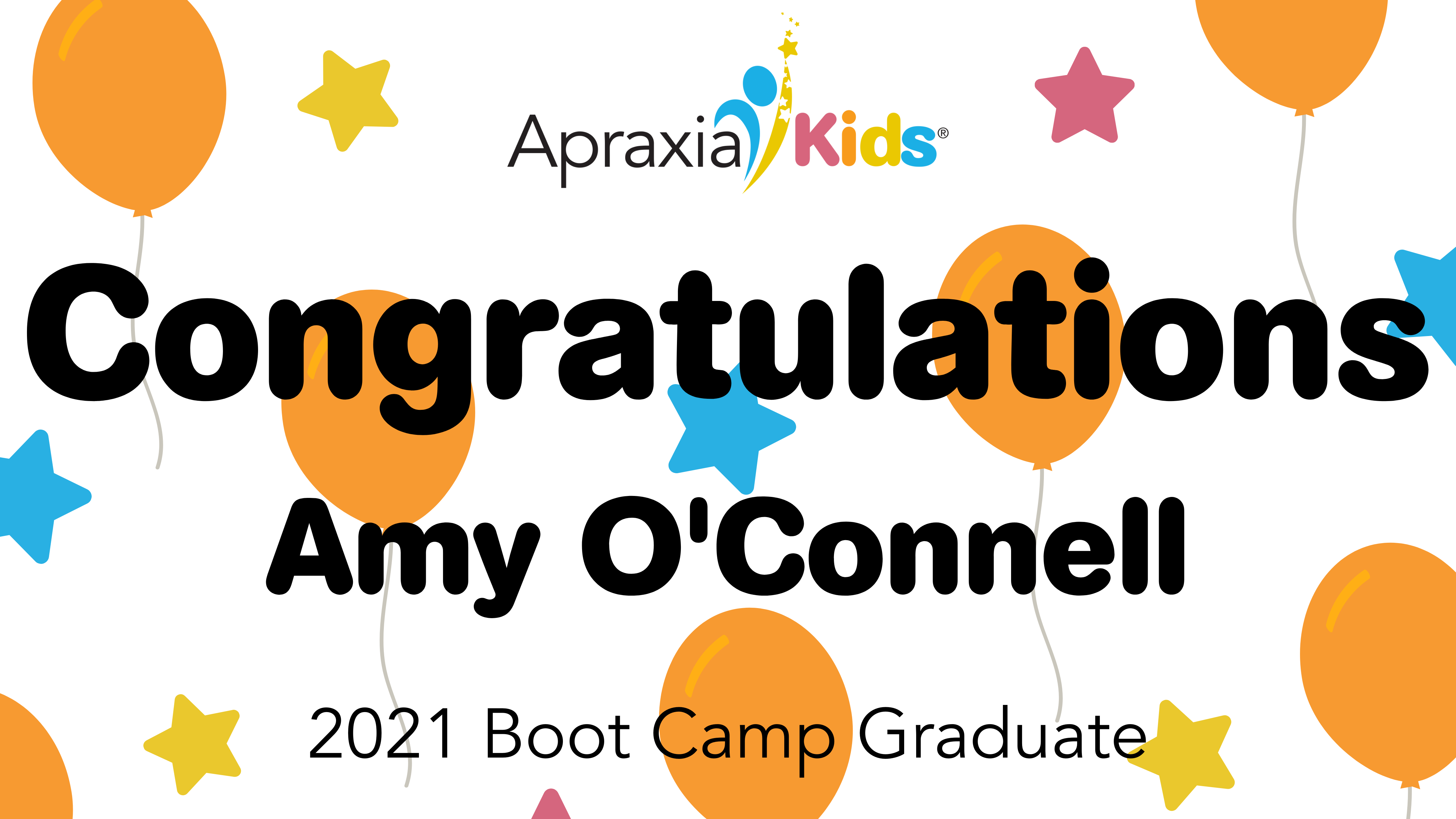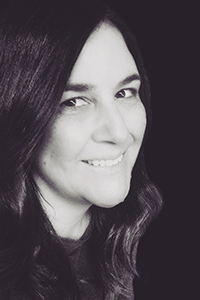
24 Jan CONGRATULATIONS AMY O’CONNELL, B.H.Sc., M.Cl.Sc., Reg. CASLPO!

Congratulations to Amy O’Connell, B.H.Sc., M.Cl.Sc., Reg. CASLPO, for graduating from the Apraxia Kids Intensive Training Institute (Apraxia Boot Camp)!
Since completion of my Master’s Degree in 2003, I have had the privilege of working primarily in the private sector, providing Assessment & Intervention support to children and adults presenting with a variety of Speech, Language, and Swallowing issues. My background is rich with experience and education in articulation disorders, motor speech and apraxia, receptive and expressive language delay, early literacy and reading delay, social communication issues, acquired brain injury, learning disabilities, stroke, progressive neurogenic disease, voice disorders, stuttering, executive function disorders, and feeding & swallowing issues. Building on over 18 years of professional experience in the Hamilton community, AO SLP Services furthers a longstanding personal commitment to interdisciplinary, functional, and goal-directed intervention.
Amy O’Connell offers services in Ancaster, Ontario, Canada.
Check out Amy’s Apraxia Kids SLP Directory Listing to learn more.
Apraxia Kids: What are the top 3 things you learned from this training experience?
Amy: The process really forced me to look deep into my clinical practice and evaluate the (assessment and treatment) approaches that I have selected for clients (both current and in the past). The experience allowed me to see how I have grown as a clinician over the past few years, specifically with regards to Childhood Apraxia of Speech. I also learned a great deal about the process of assessment and became aware of some great tools to add to my assessment toolbox. Finally, I have left boot camp with a much stronger understanding of the principles of motor learning and have been able to adjust my intervention to better include these principles throughout intervention.
Apraxia Kids: How did the boot camp experience change or expand your network of colleagues/friends?
Amy: I have been introduced to so many wonderful colleagues, both within my geographical location and beyond. Virtual boot camp allowed me to meet SLPs and researchers across the border and provided a much greater network than might have been the case had boot camp occurred in person. I love that we were able to learn from all of the course instructors and mentors. Journal Club was a great way to get to know boot campers, too.
Apraxia Kids: How have you implemented the knowledge you gained at boot camp?
Amy: I think my case study really demonstrated to me how my practice has changed over the course of journal club and then boot camp. I have adapted everything, from my initial intake questionnaire, to the assessments I run, to the way that I select targets and track progress in intervention.
Apraxia Kids: What is an example of how you have been able to (or plan to) use your expertise as a local resource/support for other professionals and/or families since attending the intensive training?
Amy: I was recently asked by a school board SLP to provide some recommendations of ways to assess a child for whom she suspects CAS. I was able to refer her immediately to some inconsistency measures as well as the MPT to help her better decipher the nature of the suspected motor speech disorder. I have also been able to provide education to several colleagues around the principles of motor learning and ways to build these elements into their therapy sessions.
Apraxia Kids: What would you say to someone considering applying to boot camp next round?
Amy: I would say that it will probably be the most work you have done since grad school but will also be one of the most rewarding things you do!

Congratulations to Amy O’Connell, B.H.Sc., M.Cl.Sc., Reg. CASLPO, for graduating from the Apraxia Kids Intensive Training Institute (Apraxia Boot Camp)!
Since completion of my Master’s Degree in 2003, I have had the privilege of working primarily in the private sector, providing Assessment & Intervention support to children and adults presenting with a variety of Speech, Language, and Swallowing issues. My background is rich with experience and education in articulation disorders, motor speech and apraxia, receptive and expressive language delay, early literacy and reading delay, social communication issues, acquired brain injury, learning disabilities, stroke, progressive neurogenic disease, voice disorders, stuttering, executive function disorders, and feeding & swallowing issues. Building on over 18 years of professional experience in the Hamilton community, AO SLP Services furthers a longstanding personal commitment to interdisciplinary, functional, and goal-directed intervention.
Amy O’Connell offers services in Ancaster, Ontario, Canada.
Check out Amy’s Apraxia Kids SLP Directory Listing to learn more.
Apraxia Kids: What are the top 3 things you learned from this training experience?
Amy: The process really forced me to look deep into my clinical practice and evaluate the (assessment and treatment) approaches that I have selected for clients (both current and in the past). The experience allowed me to see how I have grown as a clinician over the past few years, specifically with regards to Childhood Apraxia of Speech. I also learned a great deal about the process of assessment and became aware of some great tools to add to my assessment toolbox. Finally, I have left boot camp with a much stronger understanding of the principles of motor learning and have been able to adjust my intervention to better include these principles throughout intervention.
Apraxia Kids: How did the boot camp experience change or expand your network of colleagues/friends?
Amy: I have been introduced to so many wonderful colleagues, both within my geographical location and beyond. Virtual boot camp allowed me to meet SLPs and researchers across the border and provided a much greater network than might have been the case had boot camp occurred in person. I love that we were able to learn from all of the course instructors and mentors. Journal Club was a great way to get to know boot campers, too.
Apraxia Kids: How have you implemented the knowledge you gained at boot camp?
Amy: I think my case study really demonstrated to me how my practice has changed over the course of journal club and then boot camp. I have adapted everything, from my initial intake questionnaire, to the assessments I run, to the way that I select targets and track progress in intervention.
Apraxia Kids: What is an example of how you have been able to (or plan to) use your expertise as a local resource/support for other professionals and/or families since attending the intensive training?
Amy: I was recently asked by a school board SLP to provide some recommendations of ways to assess a child for whom she suspects CAS. I was able to refer her immediately to some inconsistency measures as well as the MPT to help her better decipher the nature of the suspected motor speech disorder. I have also been able to provide education to several colleagues around the principles of motor learning and ways to build these elements into their therapy sessions.
Apraxia Kids: What would you say to someone considering applying to boot camp next round?
Amy: I would say that it will probably be the most work you have done since grad school but will also be one of the most rewarding things you do!
Credentials:
Hours of Operation:
Treatment locations:
Address:
,
Phone:
Email:
Overall Treatment Approach:
Percent of CAS cases:
Parent Involvement:
Community Involvement:
Professional consultation/collaboration:
Min Age Treated:
Max Age Treated:
Insurance Accepted:




